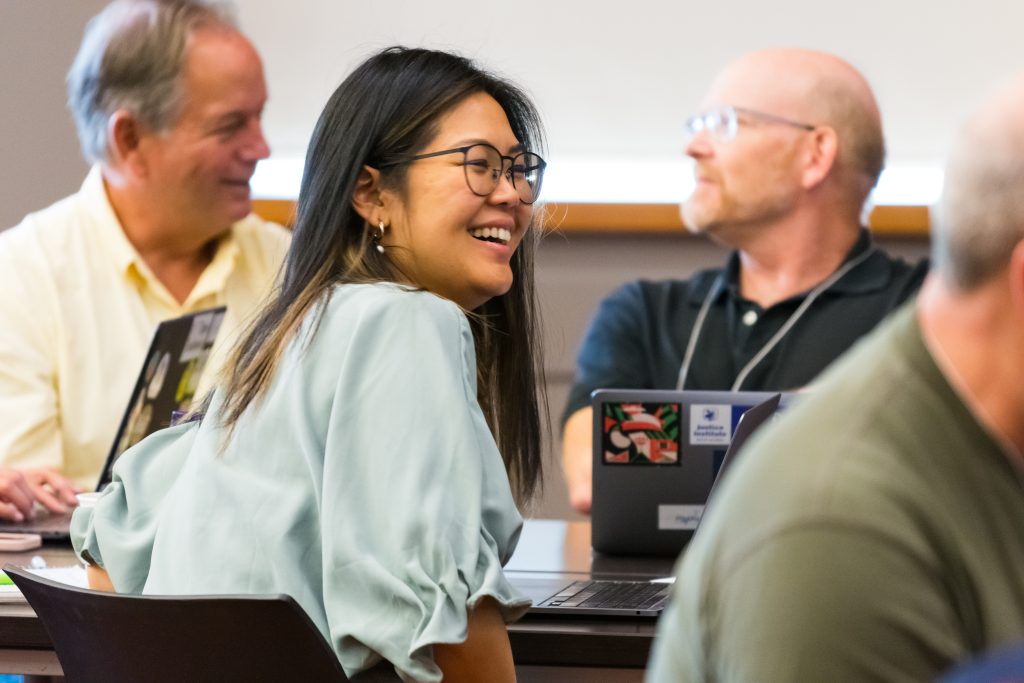What We Learned at ETUG
- 2 mins read
This is a summary article from CTLI’s attendance at the Educational Technology Users Group’s (ETUG) Spring 2023 Workshop titled “Future-proof Learning Design: The Integration of Digital Literacy, Inclusive Tech, and AI” held online and in-person at Kwantlen Polytech University (KPU) Richmond campus.

Over the 2-day workshop, emerging themes included:
- Generative AI or ChatGPT
- PebblePad
- Digital Literacy
- Accessibility, Inclusive Design and Universal Design for Learning (UDL)
- Student Well-Being
Below are my takeaways from each of the themes I’ve identified. Click through each tab to read more.
There were many overlapping sessions discussing the current usage, policies, and concerns when it comes to how institutions, faculty and students interact and engage with Generative AI or ChatGPT. Presenters whom shared their thoughts and current practice around Generative AI/ChatGPT included KPU, BCcampus, Seattle Pacific University, and Langara College.
There were lots of discussions and at the end of the day, no one has a crystal ball for the future. As educators, we recognize Generative AI is now part of our reality and instead of working against it (i.e. encourage the use of AI detection tools, or ban the use of AI), we should work with it and allow space for it in our classrooms. Encourage students to recognize its flaws, inaccuracies, hidden biases behind the “code written”, and offer students the opportunity to critically reflect on how the work of a real person differs from those generated by AI.
Many educators openly share how they use Generative AI tools in their current work which proves to be extremely helpful. Examples include writing learning outcomes, drafting course outlines, brainstorming essay questions, researching a particular subject area, and reviewing/proofreading written articles…etc.
The sessions also shared considerations around ethics, academic integrity, data privacy and copyright. Again, no crystal ball nor definitive answers to any of these questions. However, much food for thought during these discussions.
These sessions helped us reflect on our own practices here at JIBC, since many other BC Post-Secondary Institutions have publicly shared resources and their stance when it comes to the use of Generative AI, including UBC and KPU. Here at JIBC, we are currently working on compiling and finalizing our own online resource guide for faculty, staff and students.
Another overlapping theme at ETUG was PebblePad and folio thinking, presented by KPU and Langara College. KPU has been a long-term adaptor of PebblePad with an integrated design approach to Folio thinking and Langara College has recently piloted PebblePad in their Clinical Nursing Program, with the intention to expand the reach of PebblePad to more programs.
Presenters from Vancouver Island University shared an openly licensed DIY Toolkit for Digital Literacy during their session. UBC Faculty of Education showcased CC-licensed (Creative Commons LIcensed) learning modules that feature digital literacy and inclusive design practices that the team promised to share soon.
UBC Studios presented on how to create various levels of accessible videos, ranging from captions, transcripts, translations, colour contrast (for colour blindness), sign language interpretation to description videos. UBC
Also from UBC, the team shared the creation of an UDL Fellowship Program funded by the Provost and VPA office. The program supports faculty and staff to develop expertise in UDL through a cohort-based professional development program and applies UDL principles to redesign courses to become more inclusive and accessible.
Langara shared an open learning module on the use of assistive technology module in their LMS Brightspace.
A recent research project on VCC students’ perspective on academic assessment pre and post-Covid was very intriguing. Research results indicate that even though we as educators intend for alternative ways to assess and offer opportunities for authentic assessment, the feedback from students concludes that they prefer “traditional ways” of assessment (i.e. standardized multiple choice exams and papers), especially because non-traditional ways of assessment may elevate student stress levels.
BCcampus also did a short presentation on digital well-being of students using the PERMA model.
Conference Notes
Helen has kindly shared her conference notes that she created over the two days:





